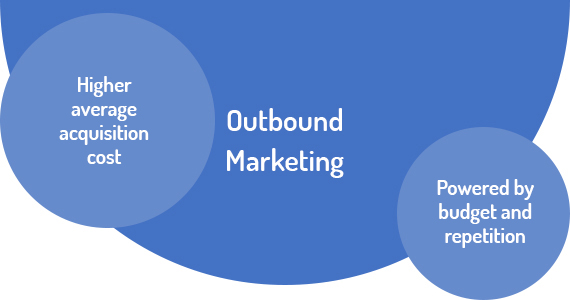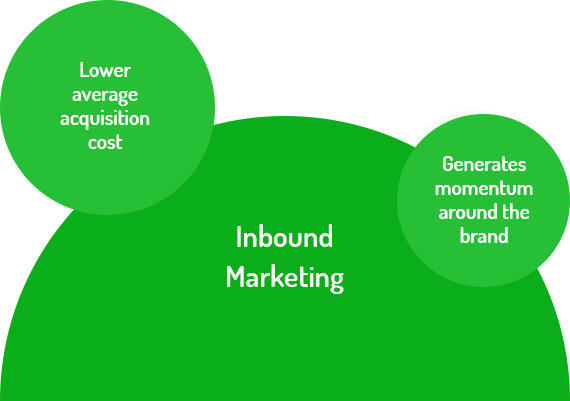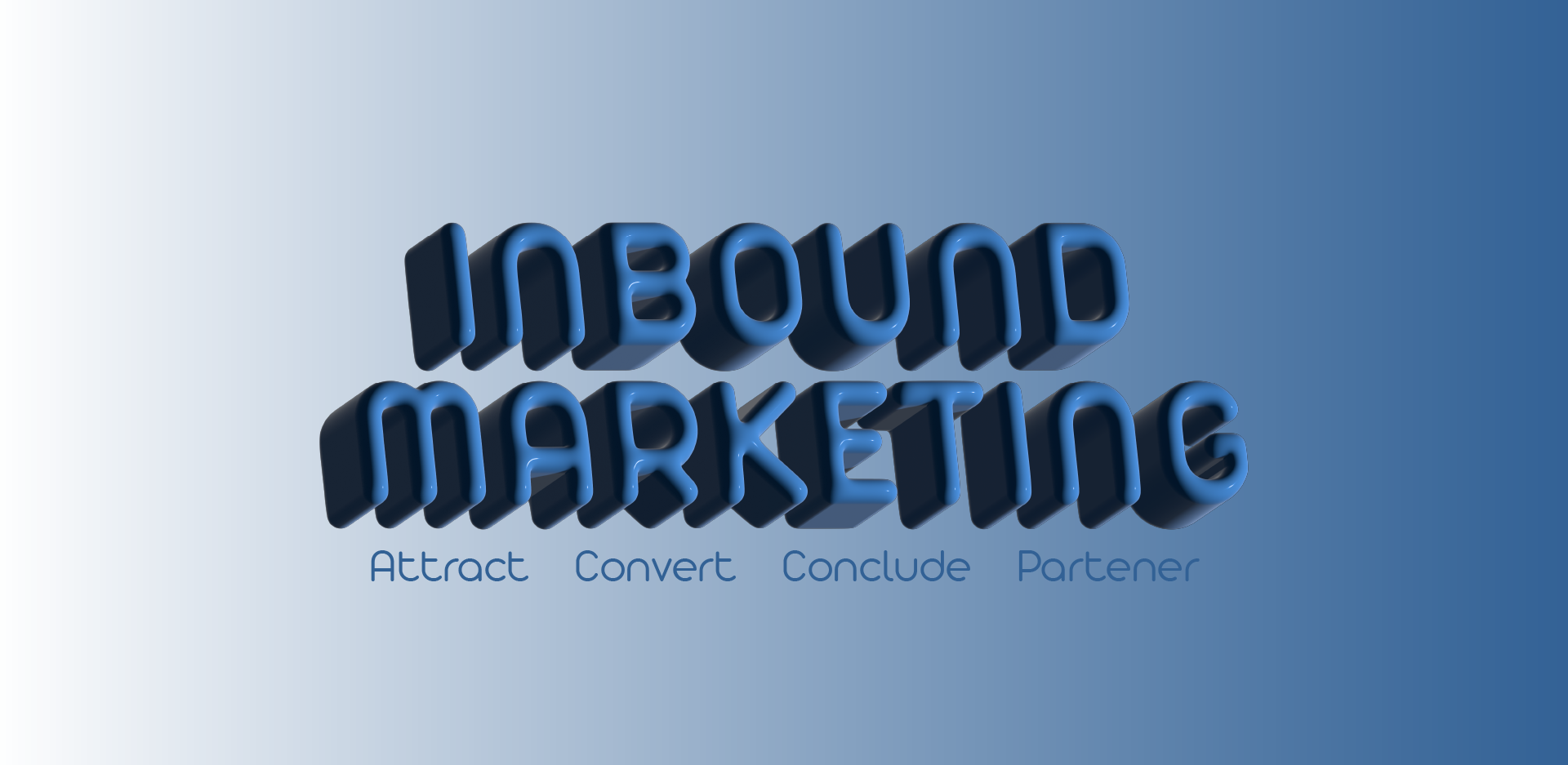Why inbound ?
Do you like receiving advertising emails to your inbox? Are you happy with companies calling your phone to advertise without your consent? Or worse still, cold calling at your front door to try and sell you a product which you might not even want? These advertising techniques are not only costly and time-consuming, but they are also intrusive.
We know that effective marketing does not have to be intrusive.
Inbound strategy enables potential clients to come to you and find your business naturally, while you offer them relevant content adapted to helping them find what they are looking for. This method of marketing could save you precious time, money, and resources while attracting 3x more potential clients to your business than traditional marketing strategies.
What is inbound marketing?
Inbound marketing is based on a content creation strategy that attracts visitors to your website and blog, converting them into leads and then into customers through different techniques such as marketing automation, lead nurturing, engagement on social networks and blogging.
This type of marketing is nowadays one of the most efficient, making it easier for customers to find what your company offers, through an interesting journey. It’s all about customers finding you because they are looking for your services, rather than you having to focus on targeting them. This method then converts leads into prospects, prospects into customers and customers into promoters through the work of marketing, sales and customer service teams.
This marketing strategy is facilitated by the integration and adoption of all-in-one reporting tools that prove the return on investment (ROI) of marketing efforts.
Below is a diagram to show you how the inbound process works.
Blog
SEO
Social Media
Landing Page
Thank you Page
Call to action
Lead nurturing
Lifeycle
Scoring
Emails and Workflows
Social networks
Workflows
Events
Special content
How does the inbound process with us work?
1. First is the discovery step – do we fit?
We need to know, first and foremost, if we are right for you and your business. Our primary concern is building trust between us and our clients and building their confidence in what we do. We realize that we are not going to be the best possible match for every business and that every business has its own unique needs. Now you have found us, you can discover more about how we can work together and then request a consultation to discuss further.
2. Then, we can explore opportunities
During your consultation we can discuss your business goals and where you are now, but more importantly, where you want to be. We would love to start the conversation and see how we could best work together to help you hit targets and achieve your goals. Your needs are as unique as your business itself so by getting to know each other, we can get an idea of what services you could benefit from and what we can bring to the table.
3. We usually start a collaboration with a 2-Day marketing workshop
This workshop will help you build a 360° vision of your business and its future. This is all about a realistic assessment of how you are doing and how we can work to make improvements. We will help you to define your target market and buyer personas, set up a detailed calendar to organize your content and we will work together to identify how we can push your business forward. This is an important step in the inbound process as it will define how you move forward in the future in an organized way.
4. Building a long-term Partnership between us
Once the marketing plan is established, we will accompany you in its implementation through online and offline marketing actions (content creation, lead generation, advertising…). We usually prefer to accompany you on a long-term basis, which we believe is more efficient than spot-actions. It is by being consistent and tenacious that we build a sustainable growth and enter the virtuous circle of inbound marketing: to Attract, Engage and Delight your clients
How can we work together ?
Marketing
Generating traffic
- Blog management
- Search Engine Optimization (SEO)
- Social media posts
- Content creation and strategy
(blog entries, videos, advertising) - Alignment with commerical strategy
- Configuration of reporting tools
Converting Leads
- Creating conversion paths
- Sales through social media
- A/B testing
- Managing advertising campaigns
Lead nurturing
- E-mail marketing
- Automatization
- Personalized content and offers
- CRM integration
Sales
Implementating CRM
- Creating personalised views and fields on websites
- Configuring transaction methods
- Importing and updating databases
- Continuous management andorganization of CRM
Sales development
- Configuring tools for conversation and calling, automatization and promotional e-mails
- Creating commercial documents
- Creating destination pages for businesses
Commercial and marketing alignment
- Defining Marketing Qualified Leads (MQLs) and Sales Qualified Leads (SQLs)
- Developing a framework contract
- Transfer of leads and feedback
- Evaluating commercial content
Client Services
Technical support
- Adding communication channels
- Configuration of a message inbox and chatbot for support and customer services
- Setting up a ticket system on-site
Knowledge base
- Creating and installing a knowledge base
- Content creation “self service”
- Updating knowledge base
Feedback
- Configuring client feedback tools and studies of net recommendations, client satisfaction, etc
- Analysis and sharing key feedback information
- Creating programmes forclient promoters of your business
Outbound vs. Inbound Marketing – what’s the difference?
Outbound marketing is what used to just be known as “marketing.” It can be interruptive, and it pushes itself at an audience, whether the audience wants it or not. TV and radio ads, telemarketing, banner and display ads, billboards, newspaper and magazine ads, cold calling, pop-ups and pop-unders are all examples of outbound marketing. This method means sales reps or marketers approach someone without knowing if he or she is even a qualified lead.
Inbound is all about avoiding any kind of forceful or unwarranted marketing techniques. Here’s a breakdown of some different techniques involved in these two styles of marketing.
Paid/Rented Email Lists
TV, Radio, and Print Ads
Billboards and Outdoor Advertising
Press Releases
Pop-Ups and Pop-Unders
Contextual Ads
Outbound Sales Calls
Trade Show Booths
Banner and Display Ads
Paid App Reviews
Video Ads


Opt-In Email Lists
Authorizing Books/Print Media
Supporting/Sponsoring Events
Press and Public Relations
Though Leadership
Community Building
Influencer Outreach
Blogging
Content Creation and Marketing
Oragnic App Store Visibilty
Video Content
“ I think outbound marketing techniques are getting less and less effective over time for two reasons. First, your average human today is inundated with over 2000 outbound marketing interruptions per day and is figuring out more and more creative ways to block them out, including caller ID, spam filtering, Tivo, and Sirius satellite radio. Second, the cost of coordination around learning about something new or shopping for something new using the internet (search engines, blogs, and social media) is now much lower than going to a seminar at the Marriott or flying to a trade show in Las Vegas. ”

Inovad is a Hubspot certified Partner
What about pricing for our other marketing services?
It’s not about the individual pieces, it’s about the total package. We can help you with marketing consulting, content creation, business blog strategy, inbound marketing website redesigns, PPC or Adwords, SEO, and many other online marketing solutions on an hourly basis or via a monthly retainer.
Let’s talk, so we can learn more about your business goals and how we can help you achieve them.

